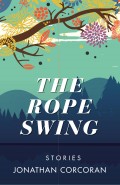
Book Review: The Rope Swing by Jonathan Corcoran

The Rope Swing: Stories
Fiction by Jonathan Corcoran
Vandalia Press, April 2016
ISBN-13: 978-1943665112
$16.99; 163pp.
Reviewed by Rebecca Skidmore Biggio
Each of the stories in Jonathan Corcoran’s The Rope Swing explores the divergent yet similar experiences of the residents of a small town in rural West Virginia where their lives feel very much out of their control. The town is nameless, its people the sort that might be found anywhere—except that they aren’t. They share something in this place, whether or not they are able to understand that.
In the opening story, “Appalachian Swan song,” Corcoran draws all the residents together in an exaggerated expression of collective nostalgia generated by the final journey of the train that once ran through their town, a literal vehicle to somewhere else, that most of them have never taken. Still, there is something about the lost opportunity that both Corcoran and his characters acknowledge. Hank, a down-and-out pawnbroker who appears later in his own story, makes his first appearance in “Appalachian Swan Song,” where he embodies the type of relationship many of the characters have with each other and with the place itself: “Nobody wanted to know Hank, but we all did. We all knew someone who had snuck into the back door of his shop in a time of trouble. His crowd wasn’t the kind to come to this type of event, but we understood. Many of us didn’t speak to Hank, but we knew that he belonged here. We understood that the train belonged to him, just as it belonged to all of us.” The metaphor of the train, like that of the rope swing in the title story, seems overwrought at first, too obvious, and it seems reasonable to wonder why Corcoran doesn’t trust his readers a little more. Yet, it begins to feel appropriate as the reader comes to understand that though these people are connected by place, by shared experiences and common emotional truths, most of them see themselves as fundamentally alone, as outcasts, as disconnected from their own lives.
Corcoran manages to capture a predominant feeling of inevitability among his characters, which is compounded by their glaring lack of self-awareness. In “Excavation,” Amy, one of the more privileged characters in this collection, can’t see beyond her own past, beyond the cultural inheritance she imagines is unavoidable: “She could see only a life on repeat—the same faces, the same drama. She would inherit her parents’ house, and then the sorry child she’d birth with the husband she’d settled for would begin the process all over again.” In “Hank the King,” we see a flawed man who is currently self-destructing, but who has nonetheless played a generous if difficult role in his community: “JB sold musical instruments to all the kids who joined the band. Hank kept a locked drawer of wedding rings that came from desperate wives who needed to pay the bills.” In “A Touch,” we meet a man who has found a new life for himself in New York, yet he remains obsessed with the boy from Ohio who is the physical incarnation of all the fears he has tried to leave behind. These are all people living their messy lives the best they can, often adding to the mess with their own bad choices. Corcoran gracefully acknowledges these universal feelings of fragility and desperation, the temptation to either run or “do anything to feel numb.”
So much of our lives plays out beyond our control. There are, however, choices to be made. Each of the characters in The Rope Swing makes a choice—to stay or to leave, to come out or remain closeted, to speak up or stay silent, to make the most of what they have or to try to change their situation. There are consequences, of course, for each choice: relationships forged or buried, fears conquered or avoided, grief overcome or overwhelming. Corcoran’s achievement in this collection is to establish a prevailing undercurrent of human connection among his disparate and damaged characters and to suggest that this potential exists for all of us. The storyteller sees this potential for connection, the self-imposed nature of the exile that many of his characters experience, though the tragedy of his narrative is that the characters cannot.
Rebecca Skidmore Biggio is a Mentor for the Afghan Women’s Writing Project. Her critical essays have appeared in Arizona Quarterly and African American Review.

Leave a Reply